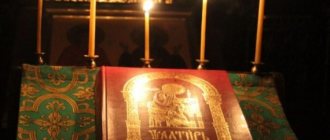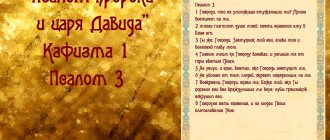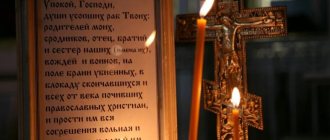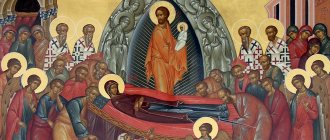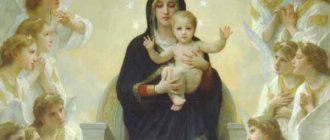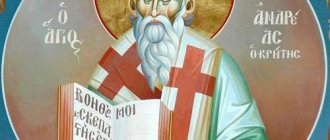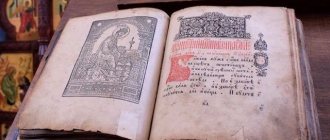Quote from message in the evening
Read in full In your quotation book or community!
The Psalter is a collection of prayers, appeals and praises of God that has come down to us through millennia. And although the Psalter is one of the parts of the modern Old Testament, in fact it is one of the oldest books of magic spells.
The Psalter was translated into the Slavic language in the 9th century by Equal-to-the-Apostles Cyril and Methodius from the Greek church text. Not only Christian priests, but also healers and sorcerers knew about the power of the Psalter and used the psalms for their needs. The psalms were and are used both for good purposes and for punishing enemies.
History of creation
The legendary Jewish king David reigned in the 11th–10th centuries. BC e. Inspired by the Holy Spirit, he wrote many psalms, which he sang during Jewish services. It is also known that David organized three choirs of singers and musicians, placing at their head people with outstanding musical and singing abilities - Asaph, Heman and Idithum.
A number of theologians consider King David to be the author of all psalms. Dissenters point out that some stories happened after his death. This objection can be refuted by David's gift of prophecy, which helped him see the future.
Davidic authorship is clearly indicated in the 73 Psalms. The rest also mention other authors, in particular the chief royal psalmist Asaph, the gatekeepers of the Jerusalem temple, called the “sons of Korah,” and the founder of Judaism, Moses. The Talmud adds other historical figures to its authors - Adam, Melchizedek, Abraham, Heman and Jedithum. The formation of the Psalter in its current form took several centuries.
The translation of the Psalter from Hebrew into ancient Greek was made in the 2nd century. BC e. This translation is usually called the Septuagint (“Translation of 70 interpreters (elders)”).
The first Slavic manuscripts of the Psalter appeared in the 9th century, and the first printed book appeared at the end of the 15th century. in Montenegro. In Rus', the Psalter, along with the primer and Book of Hours, gradually became a mandatory book for teaching literacy not only in the church, but also in the world. Many themes and quotations from the Psalter have entered literature and proverbs.
By the 16th–17th centuries. These include the first attempts to translate the Church Slavonic Psalter into the generally understandable Russian language, which were met with disapproval by the Russian Orthodox Church.
Content
The Psalter is a Jewish poem, the hymns of which are meaningfully related to each other. Along with the predominant glorification of God, these include supplications (6 and 50), lamentations (43 and 101), curses (57 and 108), a historical overview (105), and a love song (44).
The Psalter is characterized by a unity of perception of life and a commonality of religious themes, the aspiration of man and people to God as an observer and tester of the depths of the human heart.
The psalms are usually divided into three independent groups:
- laudably and gratefully;
- prayers;
- instructing.
Another group consists of prophetic-messianic hymns relating to the coming appearance of Christ. But it is not considered independent, since messianic elements are inherent in many psalms from other thematic groups.
Meaning for Christians
Reading the Psalter is much older than the Jesus Prayer. It was with quotes from the Psalter that Jesus responded to the reproaches of Jewish orthodoxy during his earthly life. Pre-Christian monks, as a rule, knew the Psalter by heart. This is the only book of the Old Testament that is completely included in the services of Orthodoxy. They are based on the Psalter, because there is not a single ritual or sacrament that does without psalms.
Their authors are people who managed to establish a special relationship with God. The words with which they addressed the Creator are an example of sincere and fervent prayer. And the soul of every Christian strives for the possibility of living prayerful communication with God. After all, prayer and fasting are weapons left to us by God to counter the wiles of the devil. The Psalter is the oldest godly prayer, which is constantly read in churches and at home.
For most Christians, the Psalter is the second most important holy book after the Gospel. Therefore, the practice of jointly publishing the Gospel or the entire New Testament with the Psalter is widespread.
Structure
Numbering
The division of the text into psalms and, naturally, their numbering differ in the Jewish (Masoretic) version of Tehillim and in the Greek translation of the Old Testament - the Septuagint. The Orthodox Church is based on Greek numbering. Catholics use both numberings, and Protestants use the Masoretic numbering.
Both versions of the Psalter contain 150 canonical psalms. Psalm 151 is found only in the Septuagint.
Kathismas
The Psalter is usually divided into 20 sections - kathisma (“seats” translated from Greek), while reading which you can sit in church. Another name is poetry. The Psalter is divided into kathismas so that they are of equal length. Since psalms are of different lengths, their number in kathismas also varies. In turn, each kathisma is divided into three sections, called glories from the praises raised between them. The numbers in the table below represent the division of the Psalter into kathismas.
| Kathisma | I Glory | II Glory | III Glory |
| I | 1–3 | 4–6 | 7–8 |
| II | 9–10 | 11–13 | 14–16 |
| III | 17 | 18–20 | 21–23 |
| IV | 24–26 | 27–29 | 30–31 |
| V | 32–33 | 34–35 | 36 |
| VI | 37–39 | 40–42 | 43–45 |
| VII | 46–48 | 49–50 | 51–54 |
| VIII | 55–57 | 58–60 | 61–63 |
| IX | 64–66 | 67 | 68–69 |
| X | 70–71 | 72–73 | 74–76 |
| XI | 77 | 78–80 | 81–84 |
| XII | 85–87 | 88 | 89–90 |
| XIII | 91–93 | 94–96 | 97–100 |
| XIV | 101–102 | 103 | 104 |
| XV | 105 | 106 | 107–108 |
| XVI | 109–111 | 112–114 | 115–117 |
| XVII | 118.1–72 | 118.73–131 | 118.132–176 |
| XVIII | 119–123 | 124–128 | 129–133 |
| IX | 134–136 | 137–139 | 140–142 |
| XX | 143–144 | 145–147 | 148–150 |
As you can see, the largest, the 118th, psalm occupies the entire 17th kathisma and, in turn, consists of 176 verses. The 18th kathisma contains the most psalms – 15.
Inscriptions
Inscriptions are usually called explanations contained in the psalms indicating the genre, authorship, technique and accompaniment of the performance of the psalms.
More than a third of the psalms indicate song (mismor in the Judeo-Aramaic original) as a genre. Psalms labeled as songs were sung without musical accompaniment. When specifying “psalm,” the accompaniment of the psaltery was implied. Other options are prayer (tefillah), praise (thilah). Other genre indications are interpreted tentatively. Thus, shigayon can mean both a type of melody and a musical instrument.
Mention of names does not necessarily indicate authorship. For example, the inscription “le-David” may indicate that the psalm written by another author is dedicated to David. There are direct indications of David's authorship in the 73 Psalms. Another frequently encountered inscription is “la-menaceah” (“to the end”). According to the prevailing opinion of experts, it means a reference to the leader (“chief” in the Synodal Version) of the choir of Levites who sang this psalm.
Inscriptions about technology and musical instruments are also perceived conditionally. The fact is that ancient melodic formulas are lost, and the correspondence between old and modern musical instruments is hypothetical. “Bi-nginot” and “al-neginat” are translated as “on strings”, “l ha-nhilot” - “on winds”. At the same time, “al-alamot” (“about the secret ones”) is freely interpreted in two ways – to perform the psalm in a high voice or to accompany it with a musical instrument in a high register.
Which psalms are used for what?
Psalm 1
- For the successful completion of any business.
- If there is a threat of miscarriage in a pregnant woman.
- For peace and prosperity.
- To help a woman in labor (dangerous birth, premature birth).
- To prevent evil people from entering the house (thieves, scammers, etc.)
- To wean off gambling.
- For a successful approach to superiors.
- Protection from ruin and poverty.
- Attracting wealth and prosperity to the home.
Psalm 2
- For rescue at sea.
- Amulet against drowning.
- Flood protection.
- Protection from enemies and rivals.
- For spiritual resilience in difficult situations.
- To protect against the nagging and hatred of the stepmother and stepfather.
Psalm 3
- To get rid of migraines, severe headaches
- To get rid of back pain
- To defeat blood relatives (if you are at enmity or suing)
- For protection from enemies
Psalm 4
- To attract good luck
- For protection from enemies
- From pests that do not allow you to live in peace
- From deception, traps, setups
- From blood enemies
Psalm 5
- To protect business from authorities.
- For good luck in business.
- For assistance in court.
Psalm 6
- Protection from black witchcraft.
- Healing from any eye diseases.
- Removing any negative impact.
- For skin diseases.
- to heal bones and joints.
Psalm 7
- For protection from enemies.
- Destroys black magic.
Psalm 8
- For glory, honor and respect
- For successful fishing
- For business development
Psalm 9
- To destroy the negative influences that you feel around you.
- To restore men's health.
- When a child is ill.
Psalm 10
- Protection from unclean spirits.
Psalm 11
- When you see the pride and anger of many, when people have nothing sacred left.
- Hiding from persecution or danger.
Psalm 12
- To get rid of persecution.
- Ask for mercy from higher powers.
- To solve a difficult problem.
Psalm 13
- Protects against violent death for a day.
- Helps those suffering from punishment.
Psalm 14
- Gives favor to all people.
- To protect against libel.
Psalm 15
- If you need to change an unsuccessful situation into a happy one.
- Against the presence of an evil spirit, madness, melancholy, despondency and depression.
Psalm 16
- Gives joy in sadness.
- Turns enemies into friends.
- Allows you to find out the thief's name.
Psalm 17
- Protects from evil during the day.
- They read it in gratitude for the victory over the enemy.
Psalm 18
- Theft protection.
- To protect yourself from negative influences.
Psalm 19
- Ask for help on a dangerous journey.
- To obtain a fair court decision.
Psalm 20
- From danger and any suffering.
Psalm 21
During a storm at sea.
Psalm 22
- Against misfortune.
- Used to open chakras.
- Used for cleaning.
Psalm 23
- To make your dreams come true.
- To get an answer in a dream.
Psalm 24
- For spiritual resilience in difficult situations.
- To get out of a difficult situation.
Psalm 25
- For rescue on water and from water.
- For early release from prison.
- If your enemies seek your destruction.
Psalm 26
- From danger from land or water,
- To return freedom
- From a dangerous and evil person
- To calm an angry person
Psalm 27
- To receive help in a foreign country.
- For cleansing before magical work.
Psalm 28
- To reconcile enemies.
- to increase magical powers.
Psalm 29
- Drives out an evil spirit.
- Read in gratitude during recovery.
Psalm 30
- From all evil.
Psalm 31
- From slander and slanderers.
Psalm 32
- To receive mercy.
Psalm 33
- Protects children from death.
Psalm 34
- From the influence of sorcerers (from obedience, slavery, zombies).
- From people who are plotting bad things against you.
- From dependence on bad people.
- For liberation from slavery.
- To find friends and like-minded people.
- To win a hopeless case in court.
- If your enemies seek your destruction.
Psalm 35
- Helps to win in court cases.
Psalm 36
- Against evil and slander.
Psalm 37
- From drunkenness.
- If a person is rowdy when drunk.
Psalm 38
- For a successful job search
- From slander and slanderers.
Psalm 40
- Read if your enemies led you to ruin
- From evil spirits.
- So that the enemies retreat.
Psalm 41
Psalm 42
- Read if your enemies have led you to ruin.
- If your enemies seek your destruction.
Psalm 43
- Against enemies who bring losses.
Psalm 44
- For reconciliation between spouses.
- For safety from enemies.
- For the treatment of heart diseases.
Psalm 45
- For reconciliation between spouses.
- So that lovers can be together.
Psalm 46
- Read to reconcile husband and wife.
- To receive the love and respect of others.
Psalm 47
- To be loved and respected by loved ones.
Psalm 48
- Stops enemies from causing harm.
- From mortal damage.
- If the sorcerer wants to lime you.
Psalm 49
- To protect against robbers.
- Against severe or incurable fever.
- From damage, sorcerers and sorcerers.
Psalm 50
- For repentance.
- To atone for the sins of our ancestors.
- Against severe or incurable fever.
- For rashes, acne, pimples.
Psalm 51
- They read it if they are burdened with serious sin.
Psalm 52
- Against secret enemies.
- Against slander.
Psalm 53
- Against secret enemies.
- From damage, sorcerers and sorcerers.
Psalm 54
- Calm open or secret enemies.
Psalm 55
- Against secret enemies.
- Calm open or secret enemies.
Psalm 56
- For good luck in all matters.
- To free yourself from passion.
Psalm 57
- To frustrate the plans of enemies and destroy them.
- For happiness in your endeavors.
Psalm 58
- Used to protect against enemies and rivals.
- To protect against animal attacks.
- From damage, sorcerers and sorcerers.
Psalm 59
- To prevent sinful passions.
Psalm 60
- Used as a talisman for the military.
- Read before moving to a new home for good luck and prosperity.
Psalm 61
- Read to receive a holy blessing before moving into a new home;
Psalm 62
- To protect against the machinations of business partners.
- For forgiveness of sins.
Psalm 63
- Against unfair business partners.
- From damage, sorcerers and sorcerers.
Psalm 64
- For a successful completion of the journey on the water.
- For good luck and entrepreneurship.
Psalm 65
- For good luck in all your endeavors.
- For success in all matters.
- For protection from evil spirits.
Psalm 66
- To expel evil spirits.
Psalm 67
- Against fever.
- From an evil spirit.
Psalm 68
- To free yourself from bad habits.
- Against fever, from evil spirit.
Psalm 69
- To defeat the enemy.
- Against enslavement by sinful passions.
Psalm 70
- To send the evil back.
- Against enslavement by sinful passions,
- To stop the persecution.
Psalm 71
- To be released from prison.
- For help in difficult times.
- From poverty and misery.
- For prosperity and wealth.
- So that the money arrives.
Psalm 72
- To gain worldwide fame.
- To never suffer from poverty.
Psalm73
- To save peaceful people surrounded by enemies
Psalm 74
- To appease the authorities.
- From persecution by embittered enemies.
Psalm 75
- Read by a mother who is afraid of childbirth.
- To grant forgiveness of sins.
Psalm 76
- Read daily to avoid evil.
- For protection against fire and water.
Psalm 77
- Against need or danger.
Psalm 78
- For respect.
Psalm 79
From mortal enemies.
Psalm 80
- To keep friends from making mistakes.
Psalm 81
- To keep friends from making mistakes.
Psalm 82
- To increase business.
- To attract investment.
Psalm 83
- For safety in war.
- To avoid capture.
Psalm 84
- From sweating.
- If you smell bad.
Psalm 85
- For understanding between people.
Psalm 86
- For recovery after illness.
Psalm 87
- For recovery after illness.
Psalm 88
- For recovery after illness.
Psalm 89
- For recovery after illness.
Psalm 89
- To make it rain.
Psalm 90
- Against the deception of evil spirits, ghosts against incurable disease.
- At sea and epidemics.
- In case of serious illness.
Psalm 91
- Against the deception of evil spirits, ghosts against incurable disease.
Psalm 92
To achieve high honors.
Psalm 93
- For revenge if you were unfairly offended.
Psalm 95
- To defeat enemies and infidels.
Psalm 96
- From the witchcraft of other nationalities.
- From return witchcraft.
- Brings contentment and happiness to your family.
Psalm 97
- Brings contentment and happiness to your family.
- To bless the family for happiness.
Psalm 98
- To establish peace and unity between families.
- To develop your spiritual perfection.
Psalm 99
- To fulfill a good wish.
- Opens the gates of good fate and bestows all sorts of blessings.
- To become godly.
Psalm 100
- To overcome all enemies.
Psalm 101
- For infertility
- Protect yourself from being persecuted by evil spirits or humans.
Psalm 102
- For infertility and for conceiving a child.
- For joint pain.
- For diseases of the limbs.
- For pain in the arms and legs.
Psalm 104
- To destroy the influence of the devil.
- To find love.
- To make friends.
Psalm 105
- About enlightening people so that they do not deviate from the path of salvation.
Psalm 106
- About getting rid of infertility in women.
Psalm 107
- For the treatment of fever.
- At high temperature.
- For viral diseases.
- For inflammation.
- To improve health.
- To give strength to the patient.
Psalm 108
- Serves to expose evildoers and get rid of oppressors.
- To punish the enemy, and to send a curse.
- To defeat the enemy.
- For great success in business.
Psalm 109
- Against a powerful enemy.
Psalm 110
- To make friends.
- Make enemies and oppressors beg.
Psalm 112
- To increase your power and strength.
Psalm 113
- For the healing of mental illnesses in children.
Psalm 114
- For success in business.
Psalm 115
- Win an argument with the infidels.
Psalm 116
- For safety from violent or unexpected death.
Psalm 117
- If you have not performed the promised act of mercy.
Psalm 118
- They read according to the restless deceased.
- It is read so that you will be listened to attentively in court.
- For protection from heretics.
Psalm 119
- To get out of a difficult situation.
Psalm 120
- To help another person.
- Gives the favor of the judge.
- Protects babies from all harm.
Psalm 121
- Amulet in a dangerous place.
- For healing from the evil eye.
Psalm 122
- Read before contacting your superiors.
Psalm 123
- From snake bites.
Psalm 124
- Protects when traveling on water.
- Protects during long journeys and when traveling to another country.
Psalm 125
- Protects during long journeys and when traveling to another country.
Psalm 126
- To have a son.
- So that the baby survives.
Psalm 127
- The prohibition of evil for a newborn.
- For peace and prosperity.
Psalm 128
- For an easy pregnancy.
Psalm 129
- To live piously and virtuously.
Psalm 130
- To escape from a besieged city.
Psalm 131
- To approach the authorities.
- For good luck in government affairs.
- To pass exams.
- From evil bosses.
- From the nagging of the authorities.
- Protection from the sin of Pride.
Psalm 132
- To develop punctuality and a sense of responsibility.
- To bring harmony to a group of people.
Psalm 133
- Gives love and strengthens friendship between friends.
Psalm 134
- To increase your mind.
Psalm 135
- Repentance for sins.
Psalm 136
- Repentance for sins.
Psalm 137
- Against hatred, envy and malice.
Psalm 138
- Attracts love and friendship.
Psalm 139
- Increases and maintains love between husband and wife.
- From damage, sorcerers and sorcerers.
Psalm 140
- To remove hatred between husband and wife.
Psalm 141
- So that the danger recedes.
Psalm 142
- For pain in the hips.
Psalm 143
- For hand pain and hand diseases.
Psalm 144
- Read when your arm is broken.
Psalm 145
- Against the fear of ghosts and evil spirits.
- Against the fear of the dark.
Psalm 146
- For wound healing.
- For recovery after injury.
Psalm 147
- From scorpion and salamander stings.
Psalm 148
- From a fire.
- Strengthens magical work.
Psalm 149
- From a fire.
Psalm 150
- Whoever reads this psalm at a moment of joy will soon receive joy many times over.
- Gratitude for avoiding danger.
Why read the Psalter
The diversity of the content of the 150 hymns of the Psalter has long attracted the attention of the fathers and teachers of the church. Theologians noted that the Psalter is the quintessence of the Old Testament, having absorbed all the most valuable things from it. They wrote that there are corresponding psalms for almost all occasions in life and any mental state of a person. That is why regular reading of the psalms is an obligatory attribute of the life of a true Christian.
An example of this was shown by Jesus Christ himself. After the Last Supper, He and his disciples, ascending the Mount of Olives, sang the psalms prescribed for the Jewish holiday of Passover. And in the last minutes of his earthly life, Jesus turned to the Father with the words of the 21st Psalm. The Teacher’s example was followed by the disciples: in particular, the Apostle Paul writes in his epistles about the importance of regular psalmody. And St. Augustine said that “the love of psalmody gave birth to monasteries.”
The Inexhaustible Psalter - about health and peace in monasteries
Monks have the special grace to beg the laity. The Indestructible Psalter has enormous power and helps people. Each prayer has its own purpose. Some examples can be seen in the table:
| Cause | Psalm number |
| For humility of spirit | , , , , , , 138 |
| In times of sorrow and adversity | , 12, , , , , 142 |
| To protect yourself from serious sins | |
| In case of illness | , , |
| From damage and sorcerers | , , , , 139 |
| Praise God | , , , , 110, 112, 113, 114, 133, 138 |
| When you ask for mercy | |
| For the deceased | 118 |
| From the evil one | 142, |
These prayers give comfort and hope, calm and, in some cases, help heal from illness.
WE RECOMMEND: What prayers to read before reading the Psalms.
Reading rules
In the Orthodox Church
In the Byzantine rite, many psalms are included in the daily circle of worship and, therefore, are read daily. These include:
- in Vespers, Psalm 103 is read sequentially, then 140, 141, 129, 116, then the 33rd;
- at the beginning of matins, six psalms from psalms 3, 37, 62, 87, 102, 142 are read, and at the end - psalms 148–150;
- the canon is preceded by the 50th psalm;
- Polyeleos - the solemn part of the festive matins, includes the singing of Psalms 134 and 135.
Most of the hours, interhours, Compline and Midnight Office are psalms. They are included in the Divine Liturgy and other prayer services.
Psalm 118 (“Immaculate”) is an indispensable attribute of funeral services. This huge psalm is read in full at the funeral service and on the eve of parental Saturdays.
Church sacraments are also accompanied by the singing of psalms. Psalm 31 is performed at baptism, Psalm 50 is performed before confession, and Psalm 127 is performed at church weddings.
In monasteries it is customary to read the entire Psalter in a week. At Matins, two, sometimes three kathismas are usually read (see above), and at Vespers - one. The scheme of the weekly circle of church reading of kathismas by numbers is as follows:
- Saturday (morning): 1;
- Sunday: 2, 3;
- Monday: 4–6;
- Tuesday: 7–9;
- Wednesday: 10–12;
- Thursday: 13–15;
- Friday: 19, 20, 18;
- Saturday (evening): 16, 17.
During Lent, kathismas are also read on the clock. True, these rules are strictly observed only in Orthodox monasteries, as well as in Old Believer communities. In large monasteries, the Incessant Psalter is practiced - its continuous reading by successive monks.
At home
Since the time of the first Christians, the Psalter has been widely used for home reading. Christians often knew the psalms by heart. The widespread dissemination of the Psalter even contributed to the study of literacy using it.
An obstacle to modern home reading of the Psalter may be the incomprehensibility of the Church Slavonic language. Many theologians, however, do not recommend using its Russian translation. They point out that only those made by St. Cyril and Methodius, the Church Slavonic translation is divinely inspired, and therefore contains mystical revelations and drives away evil spirits.
On the other hand, a complete rejection of the understandable Russian text can hardly be considered justified. The most reasonable thing is to combine both versions of the Psalter. This is greatly helped by publications in Church Slavonic with parallel translation into Russian.
Another obstacle is basic laziness, which is recommended to be overcome through training. Reading the Psalter should be started in small doses, for example, starting with one Glory, gradually increasing the duration of reading. The most important thing is to do this regularly. It is especially recommended to read Plasters during fasting.
You can read the Psalter at any time of the day, including at night. It is better to read it while standing in front of a burning candle or lamp. If necessary, it is not forbidden to do this while sitting, standing up while reading the initial and final prayers, and during glories. You can read aloud or in a low voice, making sure to pay attention to the accents. The psalms are read monotonously, without expression, slightly intoned, without theatrical pathos. Home reading of the Psalter should be preceded and concluded with special prayers.
Remembrance of health and peace
After reading each kathisma, you can pray for living and deceased relatives and loved ones. After the first glory, the living are remembered for their health, and after the second, the deceased are remembered.
At the tomb of a newly deceased Christian, before burial, the entire Psalter is supposed to be read. The invited priest spends at least 3–4 hours on this, during which evil spirits are driven away from the soul of the deceased. Some relatives order a full reading of the Psalter on the 40th day.
As stated above, the 17th kathisma with the 118th psalm is read only for the departed. In church services they are commemorated in its middle (“Wednesday”), and in home services - in all three glory.
What psalms and why should you read them?
According to the Monk Arsenius of Cappadocia (the confessor of Paisius the Holy Mountain), each psalm has a need assigned to it for which it is recommended to be read. A complete list of all psalms and their corresponding life situations is given on the website.
When and for whom should you not read the Psalter?
There is a period of ten days during which the Psalter cannot be read not only to the laity in private, but also to church ministers in churches. It begins on Maundy Thursday of Holy Week and continues throughout Bright Week. During these ten days, the book of Psalms is not read either in churches or in private.
You cannot read the Psalter for suicides. As for the unbaptized deceased and people of other faiths, cell readings for them at home are allowed.
For what needs is the Indestructible Psalter ordered?
The monks have special journals with the names of Christians that must be mentioned. You can serve the Indestructible Psalter, both for the health and peace of your family and friends, for your well-being. Order a reading in order to:
- Protect a loved one from negative influences “from the outside” and the influence of evil spirits.
- To atone for sins or quench a destructive passion for bad habits: alcohol, drugs, overeating, gambling addiction, etc.
- For the well-being of the world.
- Extinguish negative manifestations in a person’s soul: anger, anger, greed.
- Heal the body or the crippled soul.
If the Psalter of Repose is read, one should not remember those who committed suicide.

